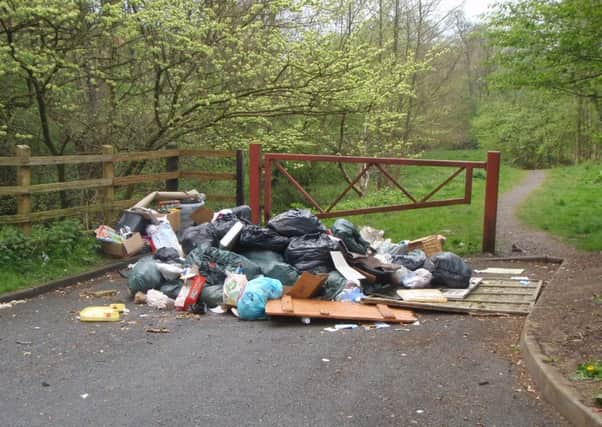25,000 fly-tipping incidents turning Lancashire into dumping ground


And the cost of cleaning up the mess now runs into millions – all of which is taxpayers’ cash which could be better used keeping other council services running.
The scourge of illegal rubbish disposal has reached almost epidemic proportions across the nation, according to the latest statistics released by the Government.
Advertisement
Hide AdAdvertisement
Hide AdAlmost 900,000 incidents were reported in 2014/15 in England, costing an estimated £50m to shift.
But while the figures have fallen in some parts of Lancashire, council leaders still believe fly-tipping is blighting the county.
And the shocking photograph of five fridge-freezers dumped at the gates of Preston Cemetery earlier this month proved nowhere is sacred to the fly-tippers.
Faced with the choice of dropping off the white goods at a recycling centre or leaving them at the roadside, the heartless dumpers left them in full view of bereaved relatives visiting their loved ones’ graves.
Advertisement
Hide AdAdvertisement
Hide Ad“Disrespectful and unacceptable,” was how horrified Town Hall bosses described the outrage.
“It’s shocking,” declared Coun Jade Morgan. “You just question why people would do that.”
But do it they will – 1,812 times in Preston alone last year.
The figure was a slight reduction from 2013/14, but it still cost taxpayers in the city up to £500,000 in clean-up charges.
Advertisement
Hide AdAdvertisement
Hide AdThe Department for the Environment, Food and Rural Affairs (DEFRA) has revealed there were 25,461 incidents of fly-tipping reported across the whole of Lancashire (including unitary authorities Blackpool and Blackburn with Darwen) in 2014/15.
That was a fall of almost 8,000 on the previous 12 months, although five of the 14 councils – Chorley, West Lancashire, Wyre, Fylde and Rossendale – all saw their figures rise.
The highest number of incidents of illegal dumping came in Burnley with 4,663. Blackpool had the next largest total at 4,328, with Lancaster third on 3,717.
At the other end of the scale South Ribble, which takes a hard line on dumping, had only 539 cases, the second smallest number in the whole of Lancashire behind Fylde (518).
Advertisement
Hide AdAdvertisement
Hide AdEven with figures so low, taxpayers in South Ribble still faced a bill of more than £40,000 to tidy up after the phantom fly-tippers.
Councils across the county admit they are fighting a never-ending war against the dumpers.
In Lancaster, Mark Davies, the chief environment officer, admittted: “Although reported incidents appear to have decreased in the district over the years, the clearing up of illegally dumped rubbish continues to be a constant battle for the council as well as an unnecessary burden on the council taxpayer’s purse.”
While the DEFRA statistics show huge disparities between district councils across Lancashire, the Government body accepts it is not a precise science.
Advertisement
Hide AdAdvertisement
Hide AdWith individual authorities adopting different criteria when it comes to classifying cases of fly-tipping, some believe high totals are not necessarily an indication of the scale of the problem in each borough.
“Where we might regard a single black bag in a back alley as fly-tipping, some authorities don’t count that,” said one council officer. “But while comparing districts accurately is not so easy, the sheer numbers of incidents recorded shows it’s a huge problem all across the county.”
Nationally reported incidents have risen steadily from 711,493 in 2012/13, to 852,042 in 2013/14 and to 899,087 last year – a rise of more than 27 per cent in two years.
The total bill for clearing rubbish up was around £50m, with a further £17.6m spent by local authorities on enforcement actions.
Advertisement
Hide AdAdvertisement
Hide AdSome private landowners, who have to pay to shift rubbish dumped on their property, believe fly-tipping has reached epidemic proportions because of increases in fees at council-run tips where, with permit systems in operation, it is now so complicated and expensive to get rid of rubbish legally. Cutbacks to in household collections are also blamed.
Richard McIlwain, deputy chief executive of Keep Britain Tidy, said: “There is a massive problem. There is an element where it is getting out of control and I don’t think the cutbacks and the closure of some household waste centres and all the rules and permits really help.
“You’ve got to make it easy for householders to do the right thing. If you make it really hard there will be a proportion of people who, say, get to the tip and get turnned away because they don’t have the right permit and who will pop it outside the gates or down a quiet street.”